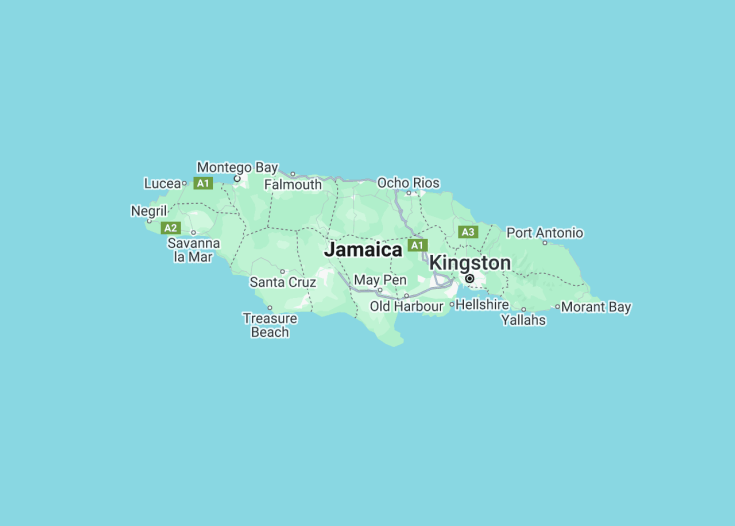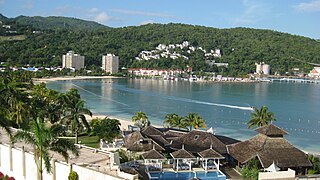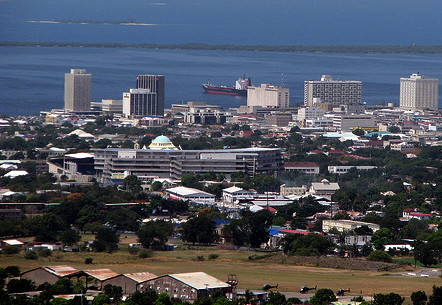Known for its vibrant culture, stunning landscapes, and rich history, Jamaica is a captivating destination that offers something for everyone. Immerse yourself in the vibrant music scene, explore the lush rainforests and cascading waterfalls, or relax on the pristine beaches. Don’t miss the opportunity to try the delicious local cuisine and experience the warm hospitality of the Jamaican people. Whether you’re seeking adventure, relaxation, or a taste of the island’s unique culture, Jamaica has it all.
For a taste of the local culture, be sure to visit the Bob Marley Museum in Kingston.
Indulge in the natural beauty of the island and take a dip in the famous Dunn’s River Falls.
How to best experience Jamaica?
Search for Tickets, tours, and activities in Jamaica using direct search on the following providers:
GetYourGuide.com Viator.com Trip.com Expedia.com Tiqets.com Ctrip.com (中文)
Top cities to visit in Jamaica
Discover the best cities of Jamaica and best places to visit.
Jamaica: The Caribbean Paradise
| Capital | Kingston |
| Time in Jamaica | GMT-5 |
| Language spoken | English |
| Population | 2.93 million (World Bank, 2019) |
| Religion | Christianity (63%), Others (31%), No religion (6%) |
| Currency | Jamaican dollar (JMD) |
| Airports | Norman Manley International Airport Sangster International Airport |
Jamaica: a destination that captivates with its mesmerizing natural beauty and vibrant culture. Known for its sandy beaches, stunning waterfalls, and reggae music, Jamaica is a Caribbean paradise that offers a unique and unforgettable experience for every traveler.
Where is Jamaica located?
Jamaica is an island country located in the Caribbean Sea, south of Cuba and west of Hispaniola. It is the third-largest island in the Caribbean and is known for its tropical climate and lush landscapes.
What is Jamaica famous for?
Jamaica is famous for its vibrant culture and laid-back lifestyle. It is the birthplace of reggae music, with legendary musician Bob Marley being one of its most iconic figures. The island is also known for its delicious cuisine, including jerk chicken and fresh seafood. Jamaican athletes have excelled in track and field, making the country proud with their incredible performances on the world stage.
History
Jamaica has a rich and diverse history that spans over centuries, from its indigenous Taino inhabitants to its colonization by the Spanish and later by the British. The island’s history is marked by the struggles for freedom, the legacy of the slave trade, and the fight for independence. Here, we present a brief overview of Jamaica’s historical periods:
Pre-Columbian period to 1494
Before the arrival of Christopher Columbus in 1494, Jamaica was inhabited by the peaceful Taino people. They thrived on the island, cultivating crops such as maize, yams, and cassava. The Taino had a complex social structure and practiced agriculture, fishing, and pottery making.
1494-1655: Spanish colonization
In 1494, Christopher Columbus claimed Jamaica for Spain. The Spanish established settlements and brought African slaves to work in the sugar plantations. However, Jamaica became a haven for pirates and a base for privateering against Spanish ships. In 1655, the British successfully invaded the island, leading to the end of Spanish rule.
1655-1834: British colonization and slavery
With the British takeover, Jamaica became a colony and a major center of the transatlantic slave trade. Enslaved Africans were forced to work on sugar plantations, which made Jamaica one of the most prosperous but also the most brutal slave society in the Caribbean. The abolition of slavery in 1834 brought significant changes to the island’s social and economic landscape.
1834-1962: Emancipation and independence
After the abolition of slavery, Jamaica went through a period of transition. The former slaves faced economic challenges, but they also gained some rights and opportunities. The 20th century saw the rise of political movements advocating for independence and social justice. In 1962, Jamaica finally gained independence from Britain.
1962-present: Post-independence era
Since gaining independence, Jamaica has faced various challenges, including economic struggles, political instability, and social inequality. The country has made significant progress in areas such as education, sports, and culture. Today, Jamaica is known worldwide for its reggae music, beautiful beaches, and vibrant culture.
Visit Jamaica
What to see and do in Jamaica
When visiting Jamaica, there are numerous attractions and activities to enjoy:
- Explore the stunning beaches and turquoise waters along the coast.
- Visit Dunn’s River Falls, a natural waterfall and popular tourist attraction.
- Experience the vibrant Jamaican culture, music, and cuisine.
- Take a tour of the Bob Marley Museum in Kingston, celebrating the life and legacy of the reggae legend.
- Delve into history at the Port Royal archaeological site, once a notorious pirate haven.
- Go hiking in the Blue Mountains, home to Jamaica’s famous coffee plantations.
- Enjoy water sports such as snorkeling, scuba diving, and jet skiing.
Events in Jamaica
Jamaica hosts a variety of events throughout the year, showcasing the country’s vibrant culture and traditions. One of the most famous events in Jamaica is the annual Reggae Sumfest, a music festival featuring renowned local and international artists. This event takes place in the summer, attracting music lovers from around the world.
Another popular event is the Jamaica Carnival, a colorful and energetic celebration of Caribbean culture with vibrant parades, costumes, and music. It usually takes place in April and is a must-see for visitors interested in experiencing the spirit of Jamaica.
Best Time to Visit Jamaica
The best time to visit Jamaica is during the winter season, from December to April, when the weather is warm and dry. This is the peak tourist season, so the beaches and attractions can be more crowded. However, the mild temperatures and clear skies make it ideal for outdoor activities and enjoying the stunning beaches.
If you prefer a quieter and more budget-friendly vacation, consider visiting during the shoulder seasons of spring (May and June) and fall (September and October). The weather is still pleasant, and you can find better deals on accommodations and flights.
Is Jamaica Worth Visiting?
Jamaica is definitely worth visiting for those seeking a destination filled with natural beauty, rich history, and vibrant culture. Its stunning beaches, lush mountains, and warm weather make it an ideal vacation spot.
However, it’s important to note that like any other destination, Jamaica has its drawbacks. The island’s high crime rate in certain areas and occasional political instability can be a concern for some travelers. It’s advisable to research and exercise caution, especially when exploring unfamiliar areas.
Despite these challenges, Jamaica offers a unique and unforgettable experience. From the infectious rhythm of reggae music to the welcoming hospitality of its people, Jamaica embodies the spirit of the Caribbean. Whether it’s lounging on the beach, exploring historical sites, or immersing yourself in the local culture, Jamaica has something for everyone.
Common questions
What are the best activities to do in Jamaica?
- Experience the Dunn’s River Falls in Ocho Rios and climb the cascading waterfalls.
- Explore the breathtaking underwater world through scuba diving or snorkeling in the crystal-clear waters.
- Indulge in the vibrant nightlife and music scene in Montego Bay.
- Visit the Bob Marley Museum in Kingston and learn about the iconic reggae musician’s life and legacy.
- Embark on a thrilling adventure and go zip-lining through the lush rainforests.
- Relax on the stunning beaches of Negril and enjoy the beautiful sunsets.
- Take a boat tour to the famous Blue Lagoon and swim in its turquoise waters.
- Immerse yourself in Jamaican culture and visit the lively markets to taste delicious local cuisine and buy unique souvenirs.
- Explore the historic sites of Jamaica, such as Port Royal and Rose Hall Great House.
- Enjoy water sports activities like kayaking, paddleboarding, and jet skiing.
What is Jamaica known for?
- Reggae music: Jamaica is the birthplace of reggae, and it is deeply rooted in the country’s culture. The legendary musician Bob Marley played a significant role in popularizing reggae music globally.
- Beaches: Jamaica is renowned for its stunning white sand beaches and crystal-clear turquoise waters. Places like Negril, Montego Bay, and Ocho Rios offer beautiful beachfronts.
- Blue Mountains: The Blue Mountains in Jamaica are famous for their scenic beauty and being the source of the world-renowned Blue Mountain coffee.
- Cuisine: Jamaican cuisine is flavorful and unique, known for dishes like jerk chicken, ackee and saltfish, and curry goat.
- Usain Bolt: The world’s fastest man, Usain Bolt, hails from Jamaica and has won numerous Olympic gold medals in sprinting.
- Rum: Jamaica is famous for its rum production, and tasting the local rum is a must for visitors.
What is the weather like in Jamaica?
- Temperature: The average temperatures in Jamaica range from 75°F (24°C) to 89°F (32°C).
- Rainfall: Jamaica experiences a rainy season from May to October, with the highest rainfall occurring in September and October.
- Sunshine: The island enjoys abundant sunshine, making it perfect for beach and outdoor activities.
- Hurricane season: The hurricane season in Jamaica runs from June to November, with the highest risk in September and October. Visitors should stay informed about weather conditions during this period.
Is it safe to travel to Jamaica?
- Tourist areas: Popular tourist areas in Jamaica, such as Montego Bay, Negril, and Ocho Rios, are generally safe for travelers. These areas have a strong security presence and are well-regulated.
- Exercise caution: While in Jamaica, it’s advisable to take common-sense precautions such as avoiding isolated areas at night, not displaying valuable items, using reputable transportation, and staying in well-known accommodations.
- Local advice: It’s always a good idea to listen to local advice and follow any warnings or guidelines provided by your hotel or tour operators.
- Violent crime: As with any destination, it’s essential to be aware of your surroundings and avoid risky situations. Incidents of violent crime can occur, particularly in certain neighborhoods in Kingston.
- Travel advisories: Stay informed about travel advisories issued by your home country’s government and adjust your plans accordingly.
What are the best beaches in Jamaica?
- Seven Mile Beach, Negril: This beautiful stretch of beach is famous for its soft white sand and crystal-clear waters. It offers a variety of water sports activities and is known for breathtaking sunsets.
- Doctor’s Cave Beach, Montego Bay: This beach is known for its calm waters and white sand. It is also home to the famous Doctor’s Cave Beach Club, where visitors can relax, swim, and enjoy the beachside amenities.
- Frenchman’s Cove, Port Antonio: This secluded beach is surrounded by lush greenery and offers a tranquil and serene environment. The turquoise-colored river meets the Caribbean Sea here, creating a unique and picturesque setting.
- James Bond Beach, Oracabessa: This beach gained fame after being featured in the James Bond movie “Dr. No.” It offers a beautiful stretch of sand, clear waters, and is a great place for swimming and snorkeling.
- Hellshire Beach, Kingston: Located near Kingston, Hellshire Beach is known for its local seafood and vibrant atmosphere. It’s a popular spot for locals and visitors alike.
What is the currency used in Jamaica?
- Exchanging currency: It’s advisable to exchange your currency for Jamaican dollars upon arrival in Jamaica. You can do this at banks, currency exchange bureaus, or at the airport.
- ATMs and credit cards: ATMs are widely available in Jamaica, and credit cards are accepted at most hotels, restaurants, and larger establishments. However, it’s always useful to carry some cash for smaller vendors or markets that may not accept cards.
- Currency exchange rates: Currency exchange rates can fluctuate, so it’s a good idea to check the rates before your trip. You can also use online currency converters or smartphone apps to get an idea of the current rates.
What are the top attractions in Jamaica?
- Dunn’s River Falls: This iconic waterfall in Ocho Rios is a must-visit. Enjoy the exhilarating experience of climbing the cascading waterfalls surrounded by lush greenery.
- Blue Mountain Peak: Embark on a hiking adventure to the highest point in Jamaica. The Blue Mountain Peak offers stunning views and is known for its famous Blue Mountain coffee plantations.
- Bob Marley Museum: Visit the former home of legendary reggae musician Bob Marley in Kingston. Explore exhibits showcasing his life, music, and the impact he made globally.
- Rick’s Cafe: Located in Negril, Rick’s Cafe is known for its stunning cliffside location and breathtaking sunset views. Enjoy delicious food, live music, and watch adrenaline junkies cliff dive into the turquoise waters below.
- Rose Hall Great House: Take a tour of this historic plantation house in Montego Bay. Learn about its haunted past and the legend of the “White Witch” who once lived there.
What is the best time to visit Jamaica?
- Peak season: The peak tourist season in Jamaica runs from December to April, coinciding with the drier and cooler months. This is the ideal time to visit if you want to escape cold weather and enjoy sunny days.
- Rainy season: The rainy season in Jamaica occurs from May to October. While it may rain more during this time, it doesn’t usually interfere with travel plans, and you can still enjoy outdoor activities.
- Crowds: If you prefer fewer crowds and more affordable prices, consider visiting Jamaica during the shoulder seasons of May and November.
- Events and festivals: Jamaica hosts various events and festivals throughout the year, such as the Reggae Sumfest, Jamaica Jazz and Blues Festival, and Carnival. Check the event calendar to plan your trip accordingly.
What are the transportation options in Jamaica?
- Taxis: Taxis are readily available in major tourist areas and towns. It’s advisable to use licensed taxis or those recommended by your hotel to ensure safety and fair pricing.
- Route taxis: Route taxis are shared taxis that follow specific routes and are a more affordable option for short distances. They may not have fixed schedules, so be prepared for some waiting.
- Car rentals: Renting a car is a popular option for exploring Jamaica at your own pace. Many international car rental companies and local agencies offer rental services. Remember to drive on the left side of the road in Jamaica.
- Buses: Public buses, known as JUTC buses, operate in major towns and cities. They are an economical way to travel, but routes and schedules can be challenging to navigate for first-time visitors.
- Private drivers: Hiring a private driver is an option for those who prefer a more personalized and comfortable transportation experience. Private drivers can be arranged through tour companies or recommended by your accommodations.
What is the local cuisine in Jamaica?
- Jerk chicken: This is one of Jamaica’s most famous dishes. Chicken marinated in a mixture of spices, including scotch bonnet pepper, allspice, and thyme, is grilled to perfection.
- Ackee and saltfish: Ackee, a fruit native to Jamaica, is sautéed with salted codfish, onions, tomatoes, and spices. It is often served with fried plantain, dumplings, or breadfruit.
- Curry goat: Tender goat meat is marinated in a spicy curry blend and slow-cooked until tender. It’s usually served with rice and peas, fried plantain, and vegetables.
- Escovitch fish: A whole fish is seasoned, fried until crispy, and topped with a tangy escovitch sauce made from vinegar, onions, peppers, and spices.
- Jamaican patties: These are savory pastries filled with seasoned ground meat (beef, chicken, or goat) or vegetables. Jamaican patties are commonly found at street vendors and are perfect for a quick snack.
What is the nightlife like in Jamaica?
- Montego Bay: Montego Bay is known for its lively nightlife. The “Hip Strip” on Gloucester Avenue is lined with bars, clubs, and restaurants where you can dance to reggae and soca music.
- Kingston: The capital city of Kingston offers a diverse range of nightlife experiences. From trendy nightclubs to live music venues and bars, you’ll find something to suit your taste.
- Ocho Rios: Ocho Rios has a more relaxed nightlife scene compared to Montego Bay and Kingston. You can find beachfront bars and clubs where you can enjoy drinks, live music, and dancing.
- Negril: Negril is known for its beach bars and cliffside establishments. You can sip cocktails while watching stunning sunsets or dance to the rhythm of reggae music.
- Resort entertainment: Many resorts in Jamaica offer their own nighttime entertainment, including live shows, themed parties, and performances by local musicians.





